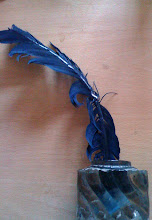I saw a very interesting documentary on Prader-Willi Syndrome this evening. I had never heard of it before but, thanks to the information super highway, I was able to Google it after the programme and learn more than I ever need to know about this interesting syndrome. It effects boys and girls equally, is found throughout all ethic groups and doesn't seem to be passed on genetically. It is a genetic disorder caused by an anomaly in chromosome 15. That's all very well Inky, I hear you say, but what effect does Prader-Willi Syndrome (named after the two doctors who first described it and more commonly called PWS) have on its suffers? Well, it does so in many different ways but the main one is that they are obsessed with food.
Born with less muscle tone, a PWS child will usually sleep more than other children and develop at a slower rate. At around the age of two they become obsessed with food and will begin to put on weight, even without a change in diet. They need up to 50% less calories than non PWS sufferers but are unable to know when they are full and think about food constantly so, naturally enough, obesity is a big problem (no pun intended). They have developmental and behavioural problems as well. Their mindset is very rigid and they dislike a break in routine or change in circumstances. Once they get stuck on a point they can obsess on it and not deviate from it unless carefully distracted. They are prone to mood swings, violent outbursts, swearing and self harm. Physically they are often small in stature and sexual maturity is very delayed if indeed fully reached. They have small hands and feet, lack muscle tone, dislike exercise, have difficulties in social situations and sleep a lot. There is no cure and the only treatment is strict diet control and behaviour management. A person with PWS can never be left alone with food (or so claims the PWS association of Australia on their website) and independent living is not achievable.
The documentary showed three different people and their families living with PWS. One, a man in his 30's, travelled to India to see a holy man for a cure and was bitterly disappointed when he didn't get one. Another, a woman, resented her father suggesting she live in a care home for PWS where the kitchens are locked insisting it was a prison, despite the residents themselves telling her how good the place was and how someone with PWS couldn't live on their own (one woman had entered the care home weighing 32st and within a year was down to 14st. She was an enthusiastic supporter of the home and tried to convince the woman by sharing her own experience, but her story fell on deaf ears). The third person the programme followed was a young girl who, despite being eldest in her family, behaved more like the youngest and whose favourite fictional character was the incredible hulk (I hope this was a genuine liking on behalf of the child as it seemed just a bit too pat as regards the documentary needs. The girl could change on the drop of a hat from a very sweet, laughing child to a screaming, violent monster and her favourite character was the incredible hulk? You certainly didn't want to see her angry).
Anyone who knows me will be aware of my own battles with weight, obesity, food addiction, self harm, short statue and fondness of sleeping yet I know I don't have PWS and I'm not even trying to claim that I have. I know I have the will power to stop eating, that no one is to blame for the weight I carry but myself. I have nothing but admiration for those who CAN'T stop eating and who still fight against the hand they have been dealt - especially to the woman who lost 18st. It is all very well to say that you are addicted to food and that it is like a drug addiction where you have to take your drug every day to survive, but who started to abuse that drug in the first place? I know I turned to food for comfort, for its numbing goodness and companionship. I worked hard to get to the weight I am today and I have to work even harder to get it off. It is a struggle, it is one day at a time and it is darn hard. However, I chose this path. People with PWS didn't, and I applaud every single one of them and their families for taking the steps on that rocky path of weight control and succeeding.








1 comment:
wow!
Post a Comment